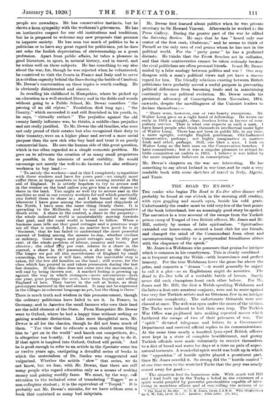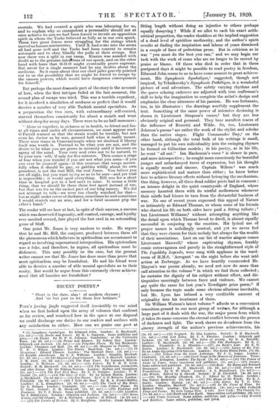THE ROAD TO EN-DOR.*
THE reader who begins The .Road to En-Dor after dinner will probably be found at one o'clock in the morning still reading,
with eyes goggling and mouth open, beside his cold grate. Unfortunately the reader must be teld v'eryfew of the best points of the book beforehand, lest an amazingly good story be spoiled. The narrative is, a true account of the escape from the Turkish
prison camp of Yosgad of two British officers, Mr. Jones and Mr.
Hill, entirely by means of fake spiritnaliern. " Spiritualism extended our house-room, secured a hunt club for our friends, and changed the mind of the Commandant from silent and uncompromising hostility to a postprandial friendliness ablaze with the eloquence of the spook."
Mr. Jones is a Welshman who possesses that genius for intrigue which is common in his countrymen. This is clearly combined-- - as is frequent among the Welsh—with benevolence and perfect
honesty. For the true Welshman loves the game far above the prize, and concocts a " drama "—it would generally be unjust to call it a plot—as an Englishman might do acrostics. The _Road to En-Dor tells of a veritable battle of heroes. Surely never did such champions front each other before. For Mt', Jones and Mr. Hill, the first a Welsh-speaking Welshman and
the latter a• first-rate amateur conjurer, were out to score against two very fine Turkish artists and an Ottoman Jew in an-intrigue of extreme complexity. The unfortunate Orientals were out.
classed at once. The web was spun under the noses of the victims. The Turks were induced to bait their own trap. The Turkish
War Office was ju-jitsued into making repeated moves which furthered the escape of two of their prisoners of war. The " spirit " dictated telegrams and letters to a Government Department and received official replies to its communications. At the same time nearly a hundred lynx-eyed British officers were kept in a state of complete bewilderment, and greasy Turkish officials were made voluntarily to restrict themselves to a diet of bread and water for days at a time on pain of super-
natural torments. A wonderful spirit world was built up in which the " opposition " of hostile spirits played a prominent part.
Once Mr. Jones overdid it. So strong did the " hostile control " at one time seem to the wretched Turks that the'prey was nearly scared away for good :-
" The situation had its humorous side. With much toil Hill' and I had built up in the Turks a belief in the existence of a spirit world peopled by powerful personalities capable of inter- fering in mundane affairs and of controlling the actions of us • The Road to gvi-Dor. By E. H. Jones. Lieut. With Illustrations by C. W. Hill. Lieut. London : John Lane. i8s. CALI mortals. We had created a spirit who was labouring for us, and to explain why so omnipotent a personality should not at once achieve its aim we had been forced to invent an opposition spirit in whom the Turks believed as fully as in our own spook. These two great forces were struggling for the strings which moved us human marionettes. Until X. had ecrne into the arena all had gone well and the Turks had been content to remain automata and to obey blindly the pulls at their strings. But now there was a split in our camp. Kiazim was assailed with doubt as to the genuine inteiftions of our spook, and on the other hand with fears that 0-0-0 might eventually prove supreme. But never for a single moment had he any doubts about the mediums. So it came about that our chief jailer gravely pointed out to us the possibility that we might be forced to escape by the unseen powers, which would have dangerous consequences for himself."
But perhaps the most dramatic part of the story is the account of how, when the first intrigue failed at the last .moment, the second plan of escape was tried. This was a terrible expedient for it involved a simulation of madness so perfect that it would deceive a number of very able Turkish mental specialists. As a preparation the two men, with extraordinary self-control, starved themselves consistently for about a month and went without sleep for many days. There were to be no half-measures : " Alone or together, in sickness or in health, to friend and ioe, at• all times and under all circumstances, we must appear mad- O'Farrell warned us that the strain would be terrible, but not even he, doctor as he was, guessed half what it really meant. There were times in Constantinople when we doubted if liberty itself was worth it. Pretend to be what you are not, and the desire to be what you are grows in intensity until it becomes an agony of the mind. Your very soul cries out to be natural, to be your own ' self,' if only for five minutes. Then comes a stage of fear when you wonder if you are not what you seem-if you can ever be yourself again-if this creature that weeps mourn- fully when it should be gay, or gabbles wildly about its own grandeur, is not the real Hill, the real Jones. You believe you are all right, but you want to try so as to be sure-and yet trial is impossible ; it would spoil everything. Hill was for a short time in hospital put in a bed next to mine. It seems a little thing, that we should lie there three feet apart instead of ten, but that was for us the easiest part of our long misery. We did not attempt to talk-we were too closely watched for that- but at night under cover of darkness, sometimes he and sometimes I would stretch out an arm, and for a brief moment grip the ether's hand."
The reader will see how at last, in spite of their success, a success which was deserved if ingenuity, self-control, courage, and loyalty ever merited reward, fate played the last card in an astounding game of bluff.
One point Mr. Jones is very anxious to make. He argues that he and Mr. Hill, the conjurer, produced between them all the phenomena which believers in spiritualism are accustomed to regard as involving supernatural interposition. His spiritualism was a fake, and therefore, he argues, all spiritualism must be dishonest. This may possibly be the case, but the present writer cannot see that Mr. Jones has done more than prove that most spiritualism may be fraudulent. He and his friend were able to deceive a number of able mental specialists as to their sanity. But would he argue from this extremely clever achieve- ment that all lunatics are fraudulent ?



































 Previous page
Previous page